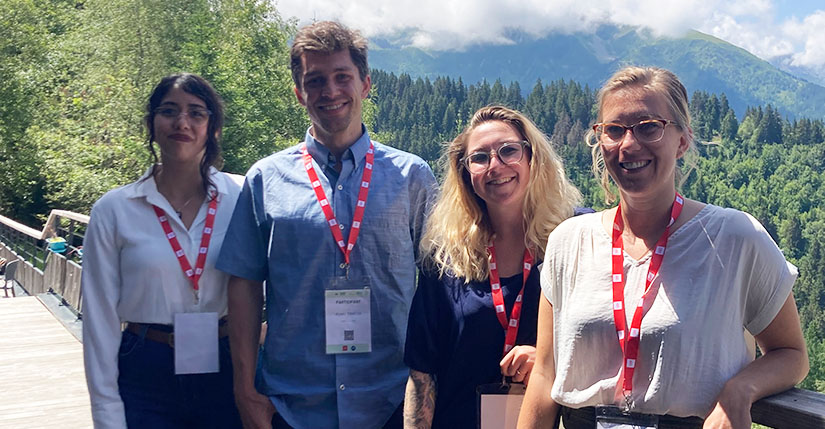Early-Career Researchers Gather in Grenoble, France, To Tackle Climate Change From a Global Perspective
RD20 Summer School Brings Together Young Researchers From Around the World To Speed the Energy Transition

In early July, 65 researchers from 16 countries gathered in a quiet town just outside of Grenoble in the northern French Alps. The group—a mix of early-career researchers and senior scientists, several from the National Renewable Energy Laboratory (NREL)—spent one week participating in lectures and discussions about the latest developments and trends in renewable energy and sustainability research.
The goal? To create an international network of researchers dedicated to making the energy transition happen as quickly as possible.
The summer school was organized under the patronage of the Research and Development 20 for Clean Energy Technologies (RD20) initiative, which is composed of leading research and development institutions from Group of 20 (G20) countries who aim to enhance international collaborations and promote innovation to enable the clean energy transformation needed to mitigate climate change. The first RD20 summer school was one of a key set of recommendations in a joint statement from all RD20 institution leaders.
"The energy transition won't be achieved with a single piece of technology, and it won't be achieved without thinking about how devices are connecting across the overall energy landscape," said Anthony Burrell, energy storage lead at NREL and summer school attendee. "The summer school let us get together and talk about how we are going to achieve this, as well as enabling early-career researchers to understand what the challenges are and begin to think in a broader sense about where their research fits into the total ecosystem and where that ecosystem is going."
The French Alternative Energies and Atomic Energy Commission (CEA) and the French National Centre for Scientific Research (CNRS) hosted the summer school—the first of what RD20 hopes will be many to come.
"As organizer, I wanted to offer an environment where we could meet, stay for a while, and encourage the young researchers to get involved in open exchanges and discussions with their peers and senior experts," said Florence Lefebvre-Joud, research director at CEA and organizer of the summer school. "The future of the planet and climate change will be tackled by their generation, so it is important for us to help develop a global network of young researchers from different disciplines."
The summer school covered a broad range of topics, including the world's energy status, renewable energy production, energy carrier storage and conversion, hydrogen and fuel cells, CO2 recycling, system life cycle assessment, critical materials awareness, and societal and economic impacts. It gave Ph.D. students, postdoctoral fellows, and early-career researchers the opportunity to learn more about low-carbon energy technologies and systems from world experts, to establish new contacts with research fellows in other countries, and to explore opportunities for collaboration. Participants also gained firsthand experience during lab tours at the CEA and CNRS facilities.
Nancy Haegel, director of the National Center for Photovoltaics at NREL, said, "The summer school was a wonderful opportunity for our early-career researchers to establish connections with researchers across the globe and to understand their research in a broader context. I was excited to see participants discussing governmental and social considerations as well as technological advancements."
The summer school also provided participants from different societal and economic backgrounds with a unique forum to meet with and learn from their peers and established experts, enabling them to get immersed in new ideas that benefit their own work and, ultimately, the future of humankind.
"While we all have our national interests, the total RD20 initiative is critical to getting together as a global community of scientists and starting to think about how we integrate our directions in multiple systems across the globe—in developed countries as well as developing countries," Burrell said.
Beyond participating in the RD20 summer school, NREL has also played a key role in RD20 in other ways. NREL represented the United States at the first RD20 conference in 2019 and helped establish the RD20 Action Committee.
"RD20 is an important initiative that brings together researchers from key research institutions around the world to tackle some of the most critical issues we face today," said Bill Tumas, associate laboratory director of the Materials, Chemical, and Computational Science Directorate at NREL. "We are thrilled to be a part of both the summer school and the RD20 initiative more broadly."
Participants and experts alike spoke highly of the event, underscoring the important opportunity it provided for sharing their extensive research efforts as well as understanding and communicating how their work contributes to the global energy transition toward a carbon neutral and sustainable economy. Both organizers and participants articulated their expectation that this new platform will be held on an annual basis to serve as a source of inspiration.
"It is time to make the energy transition happen as fast as we can," Burrell said, "and the RD20 summer school is critical for engaging the next generation of leaders."
Last Updated May 28, 2025
